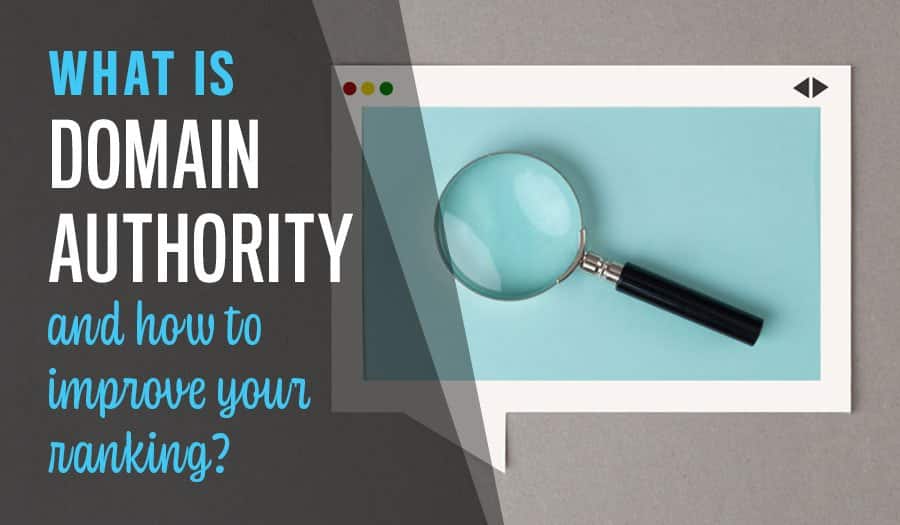Domain authority is one of the many factors Google uses to determine your website’s search engine ranking. Understanding Domain Authority also helps you measure your SEO efforts and lets you analyse the strength of your website compared to your competitors’ websites.
What Is Domain Authority and How To Improve Your Ranking?
Domain authority was developed by Moz to predict how well a site will rank. The higher your website’s domain authority, the higher your search engine ranking is likely to be and therefore the more web traffic your site is likely to receive.
How does Moz calculate your website’s domain authority?
Your domain authority is scored using an algorithm on a scale from 1 to 100, with 100 being the optimum and 1 being the lowest ranking. Domain authority of around 40 to 50 is about average, with between 50 to 60 considered a good rank and anything over 60 is deemed ideal.
Moz uses over 40 different factors to decide your ranking score, but the following factors are probably the most important for you to pay attention to if you want to improve your score:
- Linking Root Domains: This is the number of unique backlinks your website has. If your website has 10 external links from three different websites, your website has three linking root domains. Earning a few links from different websites will result in a boost for your ranking more than if you earn several links from the same website.
- MozRank: MozRank considers the quality of the links pointing back to your site, not just the quantity of external links. Regarding links, it is truly quality over quantity, with two poor quality links being beaten out by one good external link every time by the metric used to score the strength of your site’s external links. The MozRank score your website receives will be between 0-10, with the average website score being 3.
- MozTrust: MozTrust is another metric, like MozRank. MozTrust measures how connected your website is to trusted websites. MozTrust considers sites such as those ending in .gov or .edu as trusted sites, so if a .gov or .edu site links to a website, then that same website links to yours, it will increase the trust ranking of your site. Your website’s MozTrust rating will be a score from 0-10.
- Search Engine Friendliness: Your site structure affects your website’s overall usability and ultimately affects your website’s user-friendliness. The search engine friendliness of your site also refers to your use of SEO. Poor website structures not only make your site difficult for users to navigate, they also make it hard for search engines to crawl and index your site – a disaster for your rankings! Search engine friendliness is also imperative for your domain authority. If you think you need help with your website’s navigation, structure or user-friendliness, get in touch with us for a chat on how we can improve things for you.
- Social Signals: Moz uses the same social signals as Google to assess your content. Content that has been shared, liked and commented on multiple times is valuable. Moz uses these social signals while determining your website’s domain authority.
- Quality Content: Unsurprisingly, the quality of your content is an important factor in determining your website’s domain authority. Content is also the main factor in ranking your website in search engines.
How to Increase your Domain Authority
Before you look to increase your domain authority, you will probably want to find out what your domain authority currently looks like. So then, how do you determine what your site’s domain authority is? Simply head over to the free tool created by Moz (the crew that created domain authority) called Open Site Explorer (OSE) to check your website’s domain authority.
Now you understand why domain authority is so important, the factors Moz uses to determine your site’s authority, and you have looked at where your site currently stands, you are ready to take active steps to increase your domain authority score.
Firstly, for those who have not created their website yet, think about choosing a domain name that is relevant to your website. For those of you with an existing domain, your first step is to ensure the domain name you have chosen is not going to expire by renewing it for the next 3-5 years.
Optimise Your Content
SEO counts for both Google search engine rankings and your domain authority, so ensuring all your on-page code is optimised in crucial. Now, when we say all, we mean it – that includes optimising your title tags, image alt tags, and the content. We’re also serious when we say that your SEO will affect both your domain authority and your Google search engine rankings. In fact, great Google search engine rankings and achieving a great domain authority pretty much go hand-in-hand. If you’d like to know how to improve your organic Google ranking, we can help with that – just take a look here.
It is best to include variations of all your main keywords and to keep any permalinks short and relevant. Choose fonts that are easy to read, such as standard sans-serif fonts. Consider creating a sidebar section to list new posts by decorating your content with bold, italic, and underlining text to improve its readability.
Create High-Quality Content To Attract Links
To secure high-quality links from several unique domains, you will need high-quality content that is published regularly. High-quality links are worth chasing as MozRank and MozTrust consider them important factors in determining your website’s domain authority.
High-quality content is also likely to gain you a higher number of social shares, which increases your exposure and boosts the social signals’ rank when it comes to determining your domain authority.
Authoritative and trusted sites are more likely to link to your site if your content is of consistently high quality. Your content should always be relevant, useful, accurate and informative.
When you create great content and gain a loyal following for your blog and on your social pages, you will gain a reputation as an authority in your specialist area. This helps promote your brand and increase the amount of traffic coming to your website, which in turn will help your website earn quality external links from high-quality and trusted sources. You can also guest blog on other websites to help promote yourself as an authority on your topic or in your niche area.
Nail Your Internal Linking Structure
Be mindful not to fall into the common trap of focussing on your site’s external links and forgetting all about your internal links’ importance. Your internal links improve your user experience by helping to direct your users to the information they are on your site to find.
Internal links also help to keep your users engaged with your website, help to avoid frustration and make it all the easier for search engines to index your site.
Check Your Links
Links from bad sources ultimately end up hurting your domain authority, so it is a good idea to check them for harmful or toxic links every so often. Links that are broken or lead to bad sites will need to be removed. It can be time-consuming to go through your site and check on every link. You can also utilise link management tools, such as SEOPressor’s Link Manager, to manage the links on your site (learn more about SEO here).
Get Mobile Friendly & Do A Speed Check
In 2019 it is no longer an option to be optimised for mobile use. Having a site that is not optimised for mobile use will tank your mobile search engine rankings, and you will likely frustrate or lose visitors who cannot view your site correctly on their mobile device.
It is worthwhile analysing how mobile-friendly your website is – if you haven’t already, you can check out how your site rates here.
Another huge frustration for users (and a significant reason people bounce) is a website with poor loading speed. If you have specific web pages (or your entire website) with a poor loading speed, you will lose users before your site even has a chance to load. So, take the time to analyse your website’s loading speed with Google Developers’ PageSpeed Tool.
Domain authority lets you ascertain the overall performance of your website and compare your score to the websites you compete against. Now that you understand domain authority, you will also be able to judge if other sites are valuable when linking to your content. Above all, understanding domain authority helps boost your traffic and attract stronger traffic.
If you’d like help in juicing up your website’s domain authority or an overall SEO overhaul, why not have a chat with us over a coffee? We’d love to help you achieve your website goals.
Let Sydney’s leading Web Design Agency take your business to the next level with a Pixel Fish Small Business Website.
Check out some of our latest Website Design projects.
Further Reading
10 Great Ways To Improve Your Website Inbound Leads Management
The Rise of Mobile eCommerce
What’s the true cost of an online store vs a physical shop?
What Is Domain Authority and How To Improve Your Ranking?
Vimeo vs YouTube: Which will work best for your business?
Top 15 Benefits Of Guest Blogging
Facebook Reviews vs LinkedIn Reviews vs Google My Business Reviews
3 Small Business Competitive Advantage Strategies for your website
SEO Keyword Research
Twitter Vs Facebook Vs Instagram Vs LinkedIn: Which is Right for You?
Why Displaying Social Media Reviews On Your Website Is Great For Business



